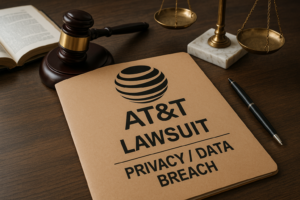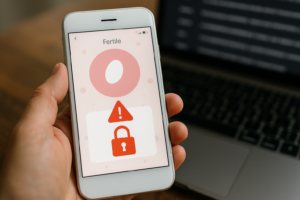
AT&T Inc. Customer Data Security Breach Litigation
Introduction Following two high-profile data incidents in 2024 (one disclosed in March and another in July), AT&T faced consolidated class action lawsuits alleging that it


Introduction Following two high-profile data incidents in 2024 (one disclosed in March and another in July), AT&T faced consolidated class action lawsuits alleging that it

Introduction In Frasco v. Flo Health, Inc. (and related consolidated claims), plaintiffs allege that the Flo fertility/menstrual tracking app shared highly sensitive information—such as menstrual
In an age where data has become the world’s most valuable commodity, the right to privacy has emerged as one of the defining legal frontiers of the twenty-first century. Every online search, purchase, or app interaction generates data that can be collected, analyzed, sold, or misused. When corporations fail to safeguard this information—or when they exploit it without proper consent—millions of consumers can suffer harm simultaneously.
Privacy class action lawsuits represent the principal means by which consumers collectively hold corporations accountable for data breaches, unauthorized data sharing, or deceptive privacy practices. These cases not only provide restitution for individual consumers but also deter future misconduct and encourage the responsible stewardship of personal information across industries.
Privacy class actions arise under a patchwork of federal and state laws designed to protect personal data and consumer confidentiality. Key statutes include:
The Federal Wiretap Act and Electronic Communications Privacy Act (ECPA) – prohibiting unlawful interception of communications.
The Stored Communications Act (SCA) – regulating unauthorized access to stored electronic information.
The Computer Fraud and Abuse Act (CFAA) – addressing hacking and data theft.
The Video Privacy Protection Act (VPPA) – restricting disclosure of consumer viewing histories.
The California Consumer Privacy Act (CCPA) and California Privacy Rights Act (CPRA) – granting consumers rights to access, delete, and restrict use of their personal data.
State Data Breach Notification Laws – mandating disclosure and remedies when consumer information is compromised.
Because privacy harms typically affect thousands or millions of individuals, class actions provide the only practical mechanism for redress. Aggregating claims into a single proceeding ensures consistent outcomes and incentivizes companies to take privacy obligations seriously.
Privacy violations often result not in physical injury, but in intangible harms such as loss of control over personal data, exposure to identity theft, or emotional distress caused by invasion of confidentiality. Courts have gradually recognized that these harms are real and compensable.
Remedies may include:
Monetary compensation for victims of data breaches or unauthorized tracking
Injunctive relief requiring corporations to improve security or limit data sharing
Implementation of new privacy protocols, encryption standards, or independent audits
Statutory damages under laws like the VPPA or CCPA
Coverage of identity protection services and credit monitoring
Importantly, many settlements also include structural reforms that extend benefits to all consumers by reshaping corporate data practices going forward.
In one of the most consequential privacy cases to date, Facebook was accused of violating Illinois’s Biometric Information Privacy Act (BIPA) by collecting facial-recognition data from users without consent. The company used photo-tagging algorithms that stored and analyzed users’ unique facial characteristics without adequate disclosure.
In 2020, Facebook agreed to a $650 million settlement, one of the largest privacy settlements in U.S. history. The case established the viability of BIPA claims and set a national precedent for protecting biometric data—such as fingerprints, facial scans, and voiceprints—against unauthorized use.
The 2017 Equifax data breach exposed the personal information of roughly 147 million Americans, including Social Security numbers, birth dates, and credit data. Plaintiffs alleged that Equifax failed to employ reasonable cybersecurity measures despite known vulnerabilities.
The resulting $700 million settlement included consumer compensation, credit monitoring, and new cybersecurity requirements. The case underscored the massive societal costs of lax data protection and motivated both private and public institutions to strengthen cyber resilience.
Multiple class actions alleged that Google continued tracking users’ locations even after they had disabled “Location History” on their devices. Plaintiffs argued that Google’s disclosures misled consumers into believing their movements were not being stored.
The company ultimately agreed to settlements exceeding $400 million across several states, along with commitments to revise its privacy disclosures. The litigation advanced the principle that consent in the digital context must be informed, transparent, and freely given, not buried in complex terms of service.
During the early months of the COVID-19 pandemic, Zoom faced a class action alleging that it shared user data with Facebook and Google without authorization and failed to prevent “Zoombombing” incidents where uninvited participants disrupted meetings.
The case was resolved in a $85 million settlement that included significant injunctive relief—enhanced encryption, strengthened security controls, and improved user transparency. The litigation pushed the entire video conferencing industry to prioritize privacy and cybersecurity amid rapid digital expansion.
TikTok faced class actions claiming that it collected biometric and personal data from minors without parental consent, in violation of federal and state privacy laws, including the Children’s Online Privacy Protection Act (COPPA).
In 2021, TikTok agreed to a $92 million settlement and implemented new safeguards, including age-verification systems and restrictions on data collection from minors. The outcome reinforced protections for children’s digital rights and highlighted the accountability of social media platforms in the youth data ecosystem.
Clearview AI compiled billions of publicly available images from the internet to build a massive facial-recognition database marketed to law enforcement and private entities. Plaintiffs alleged violations of Illinois’s BIPA and California’s privacy laws.
In 2022, the company agreed to halt sales of its database to private companies and implement compliance programs. The case marked a watershed moment in regulating emerging surveillance technologies and protecting individual autonomy in the face of powerful AI tools.
Privacy class actions force companies to internalize the costs of data misuse. They make clear that personal information is not an unregulated resource but a form of personal property deserving of protection. The threat of collective liability drives corporations to adopt stronger data governance and ethical practices.
By exposing deceptive privacy practices and compelling clearer disclosures, these lawsuits enhance consumer understanding and autonomy. Settlements often result in rewritten privacy policies, user opt-out mechanisms, and transparent consent systems.
Large-scale settlements—sometimes reaching hundreds of millions of dollars—send an unmistakable message to corporations across sectors: data privacy is not optional. The reputational and financial consequences of noncompliance incentivize industry-wide reform.
When consumers trust that their data is handled responsibly, digital markets thrive. Privacy litigation fosters this trust by establishing guardrails for responsible data innovation—balancing technological advancement with individual rights.
Many privacy class actions involve sensitive groups—children, low-income consumers, or marginalized communities—whose data can be disproportionately exploited. These cases help ensure that digital progress does not come at the expense of the most vulnerable.
Privacy class action lawsuits embody the modern evolution of consumer protection. As data collection and surveillance become increasingly embedded in daily life, collective litigation remains one of the few mechanisms capable of holding global technology companies accountable.
Beyond financial compensation, these cases reshape how corporations handle, store, and disclose personal information—setting industry standards for transparency and responsibility. In this way, privacy class actions not only vindicate individual rights but also strengthen the democratic foundations of trust, fairness, and accountability in the digital age.
Privacy class action lawsuits protect consumers when corporations misuse or fail to secure personal data. These lawsuits often arise from data breaches, unauthorized tracking, or deceptive privacy disclosures.
Recent landmark cases—against Facebook, Google, Equifax, Zoom, TikTok, and Clearview AI—have resulted in billions of dollars in settlements and significant changes to corporate data practices. The outcomes of these cases go far beyond financial compensation: they force companies to reform how they handle user information and strengthen privacy protections for all consumers.
By holding powerful corporations accountable, privacy class actions ensure that technological innovation proceeds hand in hand with respect for individual rights.
We are a leading online resource for consumers seeking clear, trustworthy information about ongoing and emerging class action lawsuits across the United States. Designed to empower individuals with knowledge and access, the site connects users directly with experienced class action law firms who can evaluate potential claims and represent them in pursuing justice through collective litigation. From product defects and data breaches to employment and securities fraud, ClassActionFirms.com provides up-to-date summaries of major cases, explains how class actions work, and helps consumers find qualified legal counsel to protect their rights and hold corporations accountable.